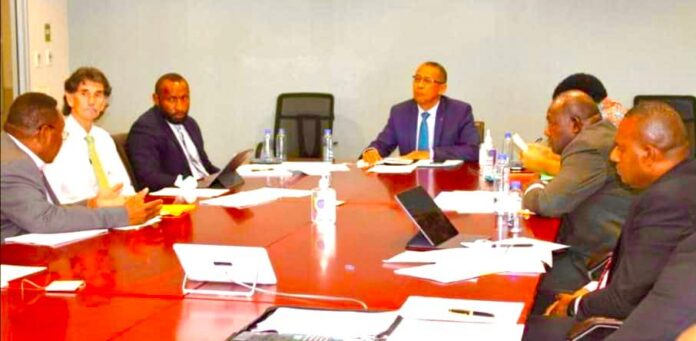
Treasury, BPNG and Finance will reform government payment system to benefit private and public sectors
THE Budget Management Ministerial Committee (BMC) comprising Chairman and Treasurer Ian Ling-Stuckey, Finance Minister Sir John Pundari, Planning Minister Reinbo Paita and his Vice Minister Dr Kobby Bomareo, met recently with Departmental Heads, Governor of Bank of Papua New Guinea Loi Bakani and BSP CEO Robyn Fleming to resolve outstanding issues with government payments.
“We have heard the frustrations of our local businesses, Members of Parliament and Government Agencies, with late and declined government payments. This has to stop if we are to deliver services to our people,” said Treasurer Ian Ling-Stuckey.
“Extraordinarily, as the meeting explored deeper into the underlying issues, there were three main factors that contributed to the bouncing cheques issue.
“First, over the last decade, with growing concerns about corruption and new anti-money laundering and counter-terrorist financing laws, there has been an increasing but seemingly, uncoordinated practice to double and triple check the authorizations of payments made by government. More and more of the underlying documentation to authorize payments had to be sent to both commercial banks as well as BPNG.
“Second, the updated Kina Automated Transfer System (KATS) introduced by BPNG has modernized many elements of banking in PNG. Cheques used to take 14 days to clear. Now, if they are not cleared in two days, they are dishonoured. This means that if all the increased documentation is not provided in only two days, then the cheque will automatically bounce.
“Third, from September last year, the meeting heard for the first time on Tuesday that the email from the Department of Finance that used to provide the necessary documentation within two days broke down since about September last year and for all of the 4th Quarter, and this was apparently, the primary reason for bounced cheques, according to frank advice tabled by the Deputy Governor of the Bank of PNG (BPNG).
“So the breakdown in the Finance Department email system, combined with the reduction in the cheque clearance time to two days, combined with the increased duplication of documentation requirements, appears to have contributed and resulted in the recent experience of bounced cheques. In the month of December 2020, government cheques valued over K500,000.00, that were dishonoured totaled K200 million, of which K74 million were rewritten but dishonoured again. This is clearly unacceptable. More needs to be done to deal with the underlying issues,” stated Ling-Stuckey.
“The Budget Management Ministerial committee (BMC) meeting on Tuesday resolved to modernize the government payment system and was advised that the primary solution to ending bounced cheques included adopting electronic transfers for all government payments. It was the view of all BMC ministers and their departments, that the very long checklist, adopted by the Bank of PNG should be reduced, if not, perhaps eliminated altogether, and that oversight of a checklist, be transferred back to the Department of Finance and/or the originating source of the funds.
“It is embarrassing that the Government of PNG is unable to meet its bills reliably and on time. Our SME’s are crying out for money they are owed, and all they receive are bouncing cheques.
“The BMC meeting directed the Secretary of Finance to ensure that the documentation process from the email system does not break down again. I have also asked that a backup system, perhaps consideration for an encrypted system like WhatsApp that is user friendly, is made to ensure information can get through to BPNG.
“More fundamentally, we must address the underlying issues. Our meeting agreed the multiple document checklist culture must end,” Treasurer Ling-Stuckey said.
“Our Departmental Heads have been tasked to work with the Bank of Papua New Guinea and the commercial banks to do away with outdated practices.
“We can do this while still maintaining the integrity of our Anti-Money Laundering Laws. Australia and New Zealand manage government payments and their international obligations successfully without needing additional oversight by third parties.
“It is time we modernized our systems to bring them in line with international best practice.”
“Countries like Fiji have used electronic transfers for years. It is embarrassing that PNG is still stuck in 1975 issuing a very large share of payments through paper cheques.
“Cheques create opportunities for corruption and slow down our financial system.”
Minister Sir John Pundari said that the Department of Finance would review the Integrated Financial Management System and develop a plan to move to electronic transactions.
“This will stop the perennial problem of bouncing cheques. You can’t electronically transact funds that you don’t hold. Our private sector relies on electronic transactions. It is time our public sector moved to a modern payment system suitable for a rapidly developing country like Papua New Guinea,” said Sir John.
Press Release
